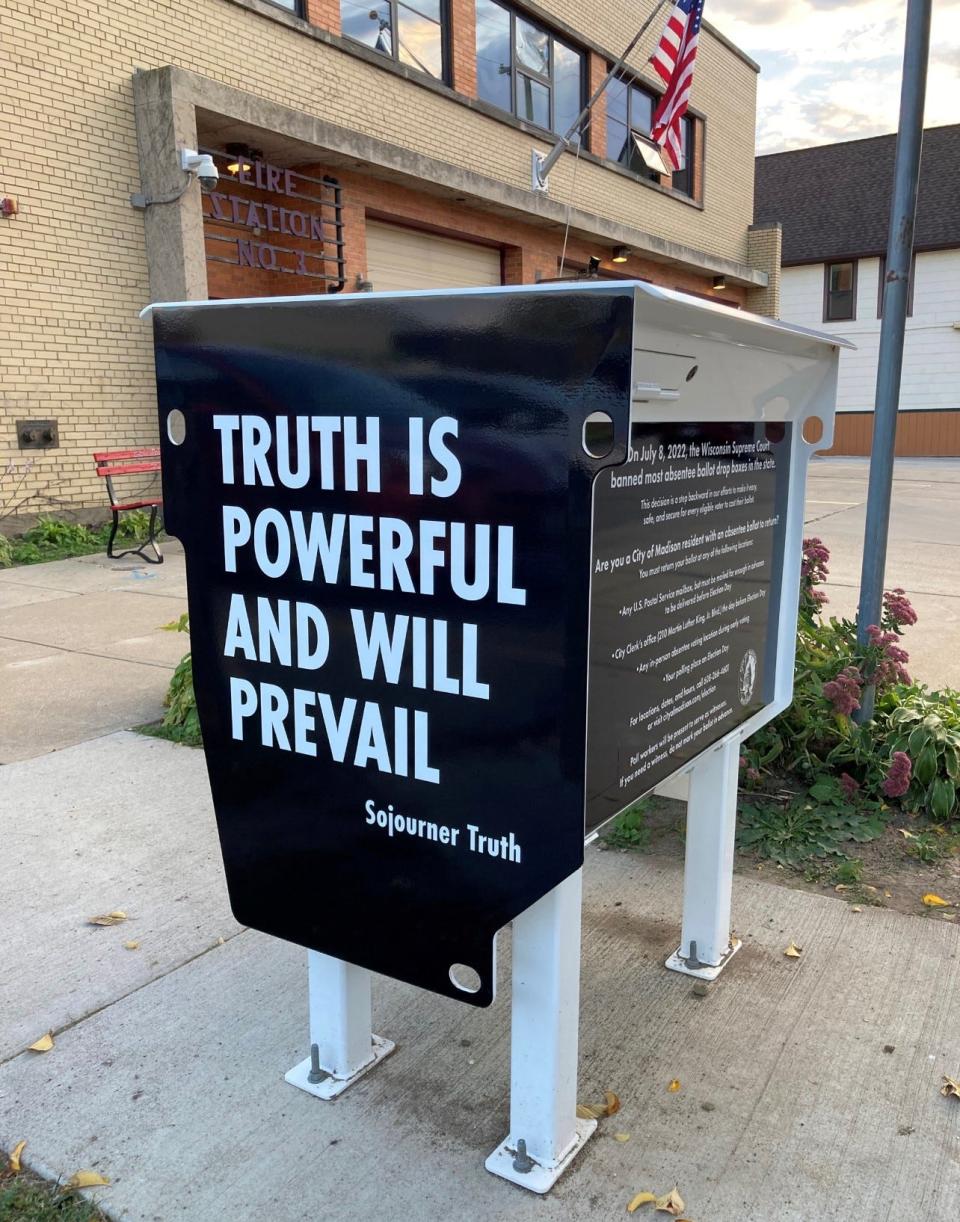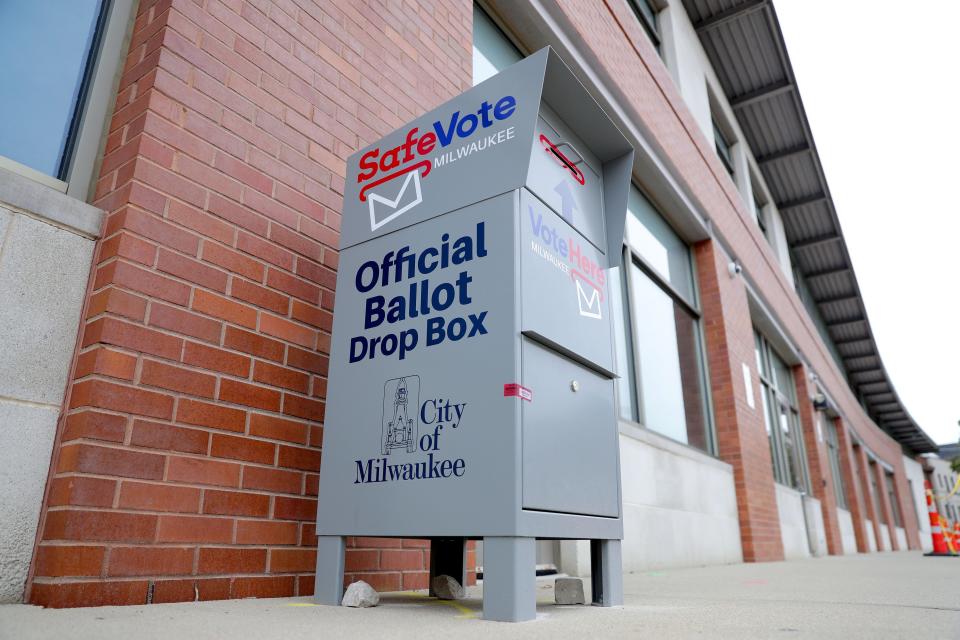Will ballot drop boxes be legal again in Wisconsin? Here's what to know about the state Supreme Court case.
The Wisconsin Supreme Court is set to hear oral arguments Monday in a case that could restore the use of absentee ballot drop boxes in the state.
The same court ruled drop boxes illegal in 2022, barring voters from returning their absentee ballots using the boxes that sprang up in many communities during the COVID-19 pandemic.
The case, which challenges the previous drop box decision and another ruling that prohibited clerks from filling in missing address information on absentee ballots, was filed just two weeks before the court flipped to a liberal majority last summer.
That means the court could again allow drop boxes to be used in Wisconsin, perhaps before the August and November elections.
Here's what to know about the legal timeline of drop boxes, when and where they were used in Wisconsin and what could happen next:

What is an absentee ballot drop box, anyway?
Drop boxes are receptacles where voters can return their completed absentee ballots, rather than through the mail, at a clerk's office or at their polling place.
In 2020 guidance to clerks, the Wisconsin Elections Commission described them as a secure, locked box, staffed or unstaffed, that should be permanently cemented to the ground and made of a durable material like steel. They can cost as much as $6,000.
Drop boxes had been used since the 1980s or 1990s in Wisconsin and other states. But they exploded in popularity during the pandemic to help voters cast ballots while limiting interaction with other people.
In Wisconsin, drop boxes have been located outside city halls, fire stations and libraries, for example. Eau Claire installed a drop box at City Hall and at three Festival Foods locations in the city, the Journal Sentinel reported in 2021.
How many drop boxes were there in Wisconsin, and where?
In spring 2021, there were about 570 drop boxes in Wisconsin, according to court filings. Out of Wisconsin's 72 counties, at least 66 had drop boxes as of spring 2021, PolitiFact Wisconsin noted.
While Republicans, including former President Donald Trump, have heavily scrutinized the use of drop boxes, they were used widely in Wisconsin, including in conservative areas.
What are the arguments for and against drop boxes?
Proponents of drop boxes say they were a safe and convenient way for voters to return ballots during the pandemic. They have also said drop boxes made voting more accessible to elderly voters or those with disabilities, such as having a neighbor return their ballot to a drop box. Proponents also argue drop boxes are more secure than placing ballots in a mailbox, which can have less surveillance.
Opponents of drop boxes have argued they're illegal because state law doesn't specify them — it only specifies mailing back ballots or delivering them in-person to a clerk. Republicans have also scrutinized the use of outside grants — now prohibited for election administration in Wisconsin — to help buy equipment like drop boxes, arguing funding from Facebook founder Mark Zuckerberg to help clerks in 2020 unfairly advantaged Democratic-leaning areas.
More: Vos’ claim on ‘illegal’ drop boxes conflicts with earlier stance on their use
More: Fact Check: Claim that Meagan Wolfe allowed absentee drop boxes, ballot harvesting is false

When did drop boxes become illegal in Wisconsin?
It's been about two years since drop boxes were no longer an option for returning absentee ballots. The most recent ruling, which made drop boxes illegal in Wisconsin, came from the state Supreme Court in July 2022. The 4-3 ruling came four weeks before statewide primaries held on Aug. 9 that year.
In January of that year, a Waukesha County judge determined state law didn't allow the use of unstaffed ballot drop boxes. The state election commission appealed the case. An appeals court allowed drop boxes to be used for the February primary, but not in the April election in 2022.
Could the Wisconsin Supreme Court rule drop boxes legal again?
The Wisconsin Supreme Court had a conservative majority when it determined drop boxes were illegal in 2022. But that's not the case now: The addition of Justice Janet Protasiewicz flipped the court to a liberal majority for the first time in over a decade.
While it's impossible to predict how the court will rule, it's likely that a liberal majority would be more friendly to the idea of reinstating drop boxes. All three liberal justices dissented in the decision that banned them.
More: Who are the seven Supreme Court justices in Wisconsin?
Could drop boxes be open again by the fall elections?
If the court allows drop boxes again, some cities with remaining drop box infrastructure may be able to open them back up quickly. Madison City Attorney Michael Haas said, for Madison, it would be a matter of unlocking the box and likely double-checking the video security.
In an amicus brief filed with the court, the Republican Party of Wisconsin and the Republican National Committee said reauthorizing drop boxes months before the next elections would "sow chaos" and could lead to further legal challenges.
Are drop boxes part of Wisconsin law?
This is the crux of the legal arguments. Critics say drop boxes aren't laid out in state law and that lawmakers, not the state elections commission, must create rules for them. Supporters say clerks have wide authority and discretion over what tools should be used to administer elections in their communities.
More: As voters head to polls, Gov. Tony Evers urges Supreme Court to restore ballot drop boxes
Republican lawmakers pursued a bill in 2021 that would have added rules for drop boxes to state law, but it never reached Democratic Gov. Tony Evers' desk. It would have allowed a drop box at a city hall, and up to three more drop boxes on municipal property if the city had over 70,000 people.
If the proposal was signed into law, it would have limited the number of drop boxes in the state's largest municipalities. For example, Milwaukee had 15 drop box locations, and Madison had 14 drop boxes.
Some states have added language about drop boxes to state law, according to the National Conference of State Legislatures. Many include standards about how many drop boxes must be available, based on population, or require one per county.
This article originally appeared on Milwaukee Journal Sentinel: Wisconsin Supreme Court taking on absentee ballot drop boxes case
